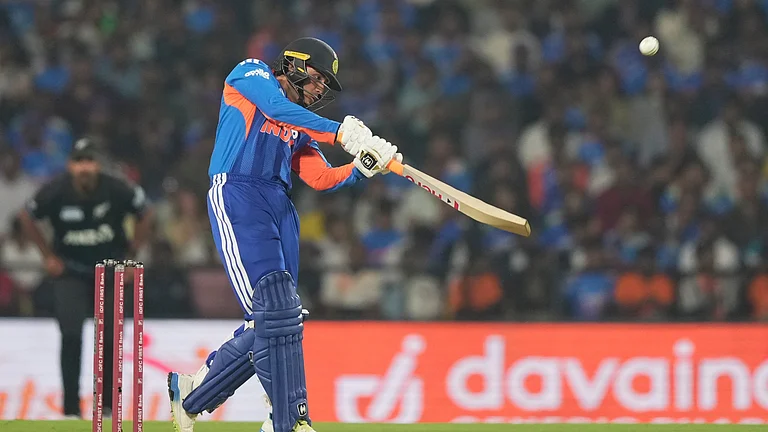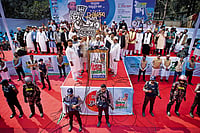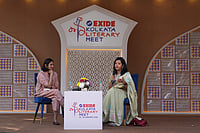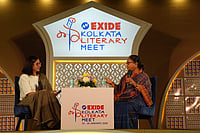Political anthropologist Irfan Ahmad is a Professor of Anthropology and Sociology at Istanbul’s Ibn Haldun University in Turkey, known for his work on various aspects of Islam and Islamophobia, including Western and Indian thought. He had taught at universities in the Netherlands and Australia before moving to Istanbul. He was also a senior research fellow at Max Planck Institute, Gottingen, Germany. He spoke to Snigdhendu Bhattacharya, putting the Indian situation in a global perspective.
If we look at Islamophobia as a phenomenon prevailing in many countries outside the Arab world, how bad is the situation in India?
Muslims are living in a state of terror and without a choice. Islamophobia has led to ugly consequences: today, Muslims’ lives are marked by social dispossession, routine humiliation, worsening economic status, and attacks on their cultural symbols like the hijab, mosques and Urdu. We have recurring cases of Muslims being lynched, with the authorities doing nothing or very little. What they can eat, wear, watch, speak and how they behave in public space are all dictated by the ideology of a Hindu nation.
A democracy that robs its own citizens to pursue their own choice and aspiration is clearly anything but a democracy. Notice that phrases vilifying Muslims seem to have become acceptable: ‘love jihad’, ‘corona jihad’, and ‘land jihad’. In use are slur words denoting Muslims’ wretched economic condition: ‘redi jihad’ (street vendor jihad) and ‘puncturewala’ because many Muslims are automobile mechanics.
What is worse is that amidst such rampant dispossession against Muslims, it is the talk of ‘Hindu genocide’ that people like Major Surendra Poonia (with six lakh Twitter followers) promote on social media. To transform aggressors into victims–it happened in the 1984 anti-Sikh pogrom too, as anthropologist Veena Das noted– is to defy facts and justice.
Among Western states, aggressive French Islamophobia is similar to the one in India. Compared to other countries, in both France and India, the State and non-State actors have been more widely involved–tacitly or otherwise–as the driver of Islamophobia.
Today is getting darker than yesterday and tomorrow seems no less dark. But we must nurse hope and work for a better future. Without hope, an ethical life is almost impossible. As oxygen is indispensable to biological life, so is hope for a moral life.

What are the main contributors to the development of the current phase of Islamophobia in India?
In the standard narrative, 9/11 is taken as the factor for the current Islamophobia. It is true, but only partly. In India, as also globally, Islamophobia predates 9/11. Consider two events in the same year: 1994. That year, B N Jog, a Marathi journalist devoted to divisive Hindutva, published Threat of Islam: The Indian Dimensions. In it, he wrote, “the raison d’être for my writing” this book is “to make Hindus aware of the true nature of Islamic aggression.” He went on: “Not in India alone, but in Spain and Balkan states in East Europe too, the Muslims completely destroyed the life of those societies.” Jog’s invention of Islam as a threat, hence Islamophobia, is linked to the earlier declaration of the ‘war on terror’ by former American President Ronald Reagan.
The same year that Jog published his book, on 26 January, Nisaruddin Ahmad, a student of pharmacy, was picked up on his way to college by the police. Accused of causing blasts on trains, the worst form of custodial violence was inflicted on him. After a legal battle of twenty-three years, in 2016, Nisar was released from jail as innocent. On his release, Nisar said in agony: “I am free but what you see now is a living corpse.”
What are the historic continuities of Islamophobia in India culminating in the present state? Have there been worse times?
If it is naive to say that Islamophobia emerged only after 9/11, it is doubly so to say that the Nehruvian era was the golden era for Muslims and with no Islamophobia. If we take Islamophobia as a vilification of Islam and Muslims, it is traceable to the very Indian/Hindu modernity. Ram Mohan Roy (1772-1833), the so-called father of the Indian Renaissance, welcomed colonialism as freedom from ‘Mohammadan Rule’ over Hindus who he fictionalised as ‘the original inhabitants’. For Roy, the English were not ‘conquerors’ but ‘deliverers’. The seed of ethnifying, Islamophobic nationalism was already present in the proto-nationalism of Roy.
With the birth of the modern nation-state, the nature and actors of Islamophobia changed. Contemporaneously, the main source of Islamophobia is the notion that Islam/Muslims are a security threat to the nation-state.
How is Muslim fundamentalism, globally and in India, shaping Islamophobia and/or being shaped by it?
If fundamentalism is taken as an attitude to stick to the fundamentals of a religion by its followers, then, practitioners of every religion will qualify as fundamentalist. However, this is not the sense in which fundamentalism is understood or used. Before terrorism became an enemy in global politics, ‘Islamic fundamentalism’ was the buzzword, especially after the 1979 Iranian revolution. Thus seen, fundamentalism is not a neutral term; instead, it is a combat concept aimed at creating a dualism between us-friend and them-enemy.
I don’t mean that there are no conservatives among Muslims; of course, there are. But is there a religion which has no conservatives?
To see the politicised use of fundamentalism at work, consider What Is This Hindu Rashtra? (1993), a pamphlet by Sitaram Yechuri, an ideologue of the Communist Party of India-Marxist. In a move to equalise what is essentially unequal, Yechuri wrote, “Hindu communalism and Muslim fundamentalism feed each other.” Notice that, for Yechuri, while Hindus have communalism, Muslims have fundamentalism. Notably, fundamentalism has a religious basis, while communalism, used for Hindus, is largely societal, stemming as it does from the community. Wittingly or otherwise, Yechuri’s formulation participates in the colonial-orientalist image of Islam.
How do you think Muslims in India should respond to the current atmosphere? What can they do to stop it?
Muslims can do very little. Since they are not the cause of the problem that we all are facing, they cannot be a solution. Hence, their response is of little value. When asked about America’s future, James Baldwin remarked that it depended on White people’s courage to ask themselves “why it was necessary to have a ‘nigger’ in the first place.” In his own view, Baldwin was a man, not a nigger. So, in a Baldwinian way, let me say this: What Islamophobes–in India and everywhere else–have to do is find out in their own hearts and minds why it was necessary to have Islamophobia in the first place. Because, contrary to their invented depiction, Muslims are not violent or barbarians, nor is the book they revere most a book of hate. If Muslims are not barbarians but humans and the Quran is instead a book of guidance, light and inspiration, Islamophobes have to find out why they invented the frightening images of Muslims and Islam.
As Islamophobia is the pivot of the New World Order, we see countries that are otherwise opposed to each other–China and the USA, India and China, for example–come together to fight ‘terrorism’, which is just a substitute for Islam. So, an effective response will mean changing the very pivot of global politics.
Additionally, as they have shown an exemplary vision of Islam and India through the peaceful women-led Shaheen Bagh movement, Muslims should maintain sabr (patience) and continue to fight, in alliance with people of other faiths and professions, for justice and pluralism. The point, however, is: will they succeed when Islamophobia is set and promoted officially?
(This appeared in the print as 'Muslims are not violent or barbarians, nor is the book they revere most a book of hate')


























